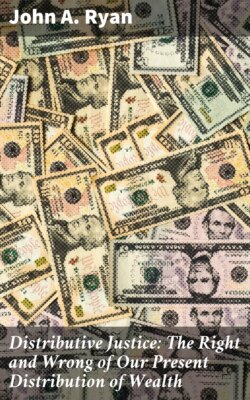Читать книгу Distributive Justice: The Right and Wrong of Our Present Distribution of Wealth - John A. Ryan - Страница 34
На сайте Литреса книга снята с продажи.
The Labourer's Claim Upon the Rent
ОглавлениеTable of Contents
Should any part of the rent go to the labourer? Let us take first the case of the labourer who is employed by a tenant, and who is not occupied in personal service but in some productive task connected with the land. Like all other wage earners he has a right to a sufficient share of the product to afford him a decent livelihood. Since the tenant is the employer, the director of the business, and the owner of the product, he rather than the landowner is the person who is primarily charged with the obligation of providing the labourer with a living wage. As noted above, his own claim to a decent livelihood is morally superior to the landlord's claim to rent; but if, having taken this amount from the product, he finds himself unable to pay living wages to all his employees unless he deducts something either from the normal interest-return on his own capital or from the rent that would ordinarily go to the landowner, he is morally bound to choose the former course. He, not the landowner, is the wage payer. That he is obliged to provide living wages to his labour force even at the cost of interest on his own investment in the business, is a proposition that will receive ample discussion and defence in a later chapter.[48]
Suppose, however, that the tenant has not the means of paying full living wages after turning into the wage fund all the money that he had hoped to retain as interest on his capital. May he withhold from the landowner a sufficient portion of the rent to cover the deficit in wages? Were this action practicable it would be undoubtedly justifiable; for the landowner's claim to rent is no stronger than the tenant-capitalist's claim to interest. As claims upon the product, both are morally weaker than the labourer's right to a living wage. Nevertheless, the tenant who should attempt to carry out this course would probably be prosecuted for non-fulfilment of his contract with the landowner, or would be evicted from the holding. Nor is the landowner obliged in such cases to give up the rent in order that a living wage may be paid to the tenant's labour force. He cannot be certain that the failure of the latter to receive full living wages has not been due to inefficiency or fraudulent conduct on the part of the tenant. Moreover, the landowner would be justified in seeking to protect himself against the recurrence of such situations by putting his land in charge of a more capable tenant, or by selling it and investing or lending the money elsewhere. However clear may be the abstract proposition that the claim to a living wage possessed by the employee of the tenant is superior to the claim to rent possessed by the landowner, the difficulty of realising this right in practice is sufficient to relieve even conscientious proprietors from the obligation of giving up the rent for this purpose.
When the landowner is operating or cultivating his land himself, he is evidently obliged to pay a living wage to all his employees at the expense of rent, just as he is obliged to do so at the cost of interest on his artificial capital. To be sure, the first charge upon the product should be a decent livelihood for himself; but, when he has obtained this, the right of his employees to a living wage is morally superior to his right to either rent or interest.
At present the State takes a part of the rent through taxation. May it take a larger share without violating justice? This question will be considered in the second chapter following. In the meantime, we shall examine the principal defects of the existing system of land tenure with a view to the suggestion of appropriate remedies, whether through taxation or otherwise.
